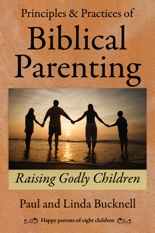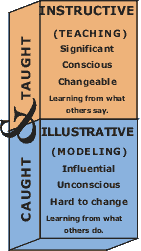
Click for information |
Principles and Practices of Biblical Parenting– Raising Godly Children –Paul and Linda Bucknell |
GOD'S GOALS FOR THE FAMILY#1
Understanding God's Design | Learning God's Way of Rescuing the Family | Embracing God's Goals for the Family | Questions
Principles & Practices of Biblical Parenting main index
Learning God's Way of Rescuing the Family
Purpose
'Learning God's Way of Rescuing the Family' shows how any family can improve their parenting skills by closely observing how children learn despite how bad our children might have got. Be ready for a surprise!
1) God Can Help Any Family!
2) Problems Creating a Godly Family
3) 'Caught and Taught' : The Problem and the Solution
4) The Pattern of Good Parenting
1) God Can Help Any Family!
God astonishes us by the way He chooses to help our broken families. He combines His wisdom, power and grace to lift up a family and cause His good purpose to be accomplished through it. We hardly know all of God's plans, but we appreciate how He helps us as we determine to work along with Him.
Many families do not have ideal starting situations, but when a parent determines to carry out God's purpose, we see God's Word has a wonderful effect on the family to change for the better.
Timothy, for example, did not have a believing father. His mother was a Jew while his father was evidently an unbelieving Greek. God's grace, however, still brightly shone through the influence of his mother and grandmother. What is it in the following passage that Paul expected Timothy to possess because it was in his mother and grandmother?
"For I am mindful of the sincere faith within you, which first dwelt in your grandmother Lois, and your mother Eunice, and I am sure that it is in you as well." (2 Timothy 1:5)
This 'faith' was more than words. It was a living faith. When God's Word is lived out, then God's Word has great effectiveness. The same is true with any of our families. Parents have a great impact on their children and when they turn to the Living God, God begins to help their whole family.
|
My wife and I are humbled by our mistakes. We see the emotional scars on the lives of our children. We teach this course so that you do not need to waste twenty years making mistakes on your children!
We have had to repent, restudy God's Word and more consistently conform our lifestyle to that of the Lord. This is of course a process. We are still going through it. However, humble hearts seeking help from the Lord can speed it up.
2) Problems Creating a Godly Family
Some Christian parents might be thinking that they have been trying so hard and not finding much help. We hope through these sessions to share some important biblical principles that will help in those situations. There are many difficult situations out there.
One person recently asked me a question about personal evangelism, "Do you say to the non-Christian who said that Christianity was "his parents' thing and not his?" The question points us to a major problem with Christian families.
 Many Christian parents think they are doing a good job of parenting when they verbally instruct their children to what they should and should not do. The problem is that truth is not primarily passed on through spoken instruction but on how their parents live out their lives.
Many Christian parents think they are doing a good job of parenting when they verbally instruct their children to what they should and should not do. The problem is that truth is not primarily passed on through spoken instruction but on how their parents live out their lives.
Many young people with Christian parents are not following the Lord because they find nothing attractive in their parents' lives. This is the root of today's secularism in parts of the world where only one or two generations ago many of the people confessed Christ.
This means that Christ in His glorious fullness was missing from the home. Wherever we find Jesus in the New Testament, the people flocked to Him so that they could know Him and listen to His teaching.
We want to make the home a place our children love to be: a place where God's love, care and forgiveness is ever so evident, a place they love to be.
Pause for Reflection: Does your child like to be home with you? Do they tend to bring their friends home to share that love they find at home with others?
3) 'Caught and Taught' : The Problem and the Solution
We need to broaden our minds to understand how basic truths and values are passed on to our children.Some say truths are 'caught not taught.' The parents' lifestyle makes an incredible impact on their children. We will expand on this below.  When a parent like Timothy's mother sincerly follows the Lord's Word, the child is wonderfully shaped (see 2 Timothy 3:15).
When a parent like Timothy's mother sincerly follows the Lord's Word, the child is wonderfully shaped (see 2 Timothy 3:15).
If what a child hears does not match up with what he sees, then he will go by what they see. The child will dismiss and even despise what is taught.
If the father obeys God, then everyone will know how important God is to his daily life. If he, however, looks very spiritual on Sunday but lives in contradiction to what God says through the week, his family will conclude that God is a religious God - for church only. They will think that God doesn't have much to do with their daily life.
Let's describe why those things that a child sees becomes so important. Many of these thoughts will be developed in following lessons. These three points describe how children unconsciously learn from their parents, that is, how they adopt the values of their parents or 'catch' the truth.

(1) Positional Learning (Responding to authority)
The parents largely shape a child's understanding of God by the way they live out their God-given roles of parenthood. This can largely be traced back to the fact that the parents are the child's only authority for the first years of his or her life. They learn how to respond to authorities from the way their parents respond to God.
The father is the authority in the home. The child's first impression of authority including God Himself comes from how his or her father expresses his authority and responds to the authorities in his life.
The mother models the gentle and caring attitudes of God. The child learns how one in control can be both strong and forthright as well as tactful, kind and a lover of relationship.
The husband shows the way someone in authority also loves by the way he loves his wife.
The wife demonstrates how to get along with authority. She faithfully supports her husband even if she disagrees with him.She models how to respect authority.
Pause for Reflection: Many children think of God as distant and uncaring. Could this be because their father has never opened up and shared his life with his children? Does God really like to talk to His children? (See Genesis 3:8)
(2) Relational Learning (Relating to others)
The child also learns how to react to life's circumstances by watching the way his parents respond to the outside world. It matters little what the parents say. The child knows what the parent believes by what his father and mother do. If the life model contradicts the words, the children will ignore the words. Let's look at several of the many scenes that shape the lives and attitudes of our children.
How does Daddy respond when someone treats him badly? Does he forgive or try to take revenge?
How does Mommy react to situations that she doesn't like and can't control? Does she trust God or worry and complain?
Is Daddy content with what he has? Does he have to buy lots of things to be happy?
Does Mom change what she might do or say because of what people might say or think? Does she fear the Lord?
When a child sees God's Word lived out, he or she gains that same faith or understanding about how life should be lived out. This does not make them a Christian, and yet it prepares them with a love for the truth. They see the sweetness of the Christian's trust in God and desire that peace and way of life more than what the world offers.
(3) Responsive Learning (Cultivating morals)
Thirdly, the child learns by the way his parents deal with him. We think mostly of a mother's care for a child in the early days of the child's life, but it must not exclude the father's care for the child. These issues greatly shape the way the child perceives what is important in life, what is right or wrong.
What does Mommy do when the baby cries? Does she always pamper the baby or sometimes allow the baby to cry when only seeking attention?
What does Daddy do when the baby interrupts Daddy and Mommy time with cute antics? Does Daddy forget about Mommy and play with the child or prioritize his relationship with his wife and play with the child later?
What does Mommy do when the baby exasperates her? Does she shun the baby or still patiently deal with him?
What does Daddy do when his son is in a stubborn fit? Does he give in and bribe the child to quietness or calmly sit out the 'storm'?
The child is unconsciously learning many things even from the time he or she is an infant. Successful parenting comes about when we combine right living with right instruction. We are cultivating more than the mind; we are shaping the soul or heart of the child.
Pause for Reflection: List one positive and one negative example that you as parents set for your children.
4) The Pattern of Good Parenting
Children of course do not consciously ask the above questions. They unconsciously observe and imitate their parents. This is why the most basic training takes place before the children are able to read or write. Good parenting involves three basic steps.
(1) Understanding the truths of God. (Knowing)
(2) Applying them to our lives as parents. (Modeling)
(3) Instructing our children in God's Word. (Instruction)
 Our children will imitate our own lives for good or bad! If we as parents do not set a good example of resolving personal relationships, then our child will not know how to resolve personal conflicts.
Our children will imitate our own lives for good or bad! If we as parents do not set a good example of resolving personal relationships, then our child will not know how to resolve personal conflicts.
We simply have not given them the tools, confidence (trust) and knowledge to solve these problems. We as parents have not given them the faith that it can or should be done. God's way of rescuing the family worked in Timothy's life and can in ours too!
Pause for Reflection: Think about how you solve conflicts with your spouse and others. How well will your child be able to solve similar personal conflicts?
=> Next: God's Goal for the Family (part of Goals of Parenting #1)
info@foundationsforfreedom.net
Scriptures typically quoted from the New American Standard Bible unless noted:
(C) Copyright The Lockman Foundation 1988











